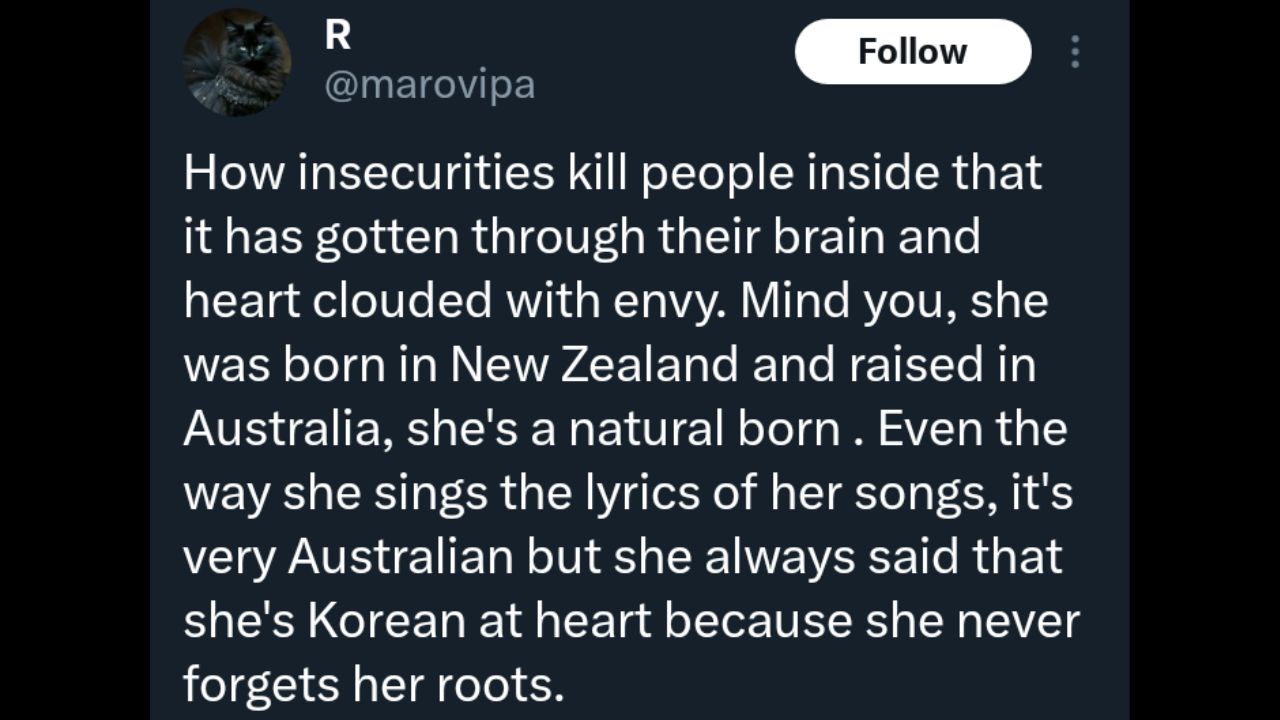K-pop idol Rosé, known for her ethereal vocals and captivating stage presence, recently ignited a heated debate among online communities. The controversy stems from her persistent choice to sport blonde hair and her latest music endeavors, which some allege are echoing Western musical styles. This has sparked a discussion on social media platforms, with some questioning if Rosé’s choices indicate a “white complex” – a desire to assimilate into Western beauty standards and musical trends.

Blonde Ambition: Analyzing the Significance of Rosé’s Hairstyle

BLACKPINK’s Rosé has consistently sported blonde hair since her debut, becoming synonymous with the platinum hue. While this has undoubtedly contributed to her striking visual appeal, it has also sparked debate about the motivations behind her choice and its potential cultural implications.
Critics argue that Rosé’s persistent blonde hair reflects a desire to conform to Western beauty standards, which often favor lighter hair colors. They point to the historical association of blonde hair with European beauty ideals and suggest that Rosé’s decision may be an attempt to align herself with these perceived standards.

Beyond Aesthetics: Exploring the Cultural Nuances of Hair Color in K-Pop
Hair color plays a significant role in K-pop, often serving as a means of visual branding and identity construction for idols. Traditionally, darker hair colors have been more common in K-pop, with blonde hair often reserved for specific concepts or to highlight a more powerful or rebellious image.
Rosé’s choice to maintain blonde hair as a consistent element of her persona challenges these conventions and raises questions about the evolving notions of beauty and identity within the K-pop industry.

Westernizing the Image?: Examining the Critics’ Perspectives
Critics who perceive Rosé’s blonde hair as a Westernization of her image often cite the increasing influence of Western trends in the K-pop industry. They argue that this trend can lead to the homogenization of K-pop aesthetics and a dilution of Korean cultural identity.
They also express concern that the emphasis on Western beauty standards may put undue pressure on K-pop idols to conform to these ideals, potentially impacting their self-esteem and authenticity.

Copyright Transfers: A Strategic Move or a Sign of Disengagement?
Uncharted Territory: Rosé’s Decision to Transfer Music Rights to the U.S.
Rosé’s recent decision to transfer her music copyrights from the Korea Music Copyright Association (KOMCA) to U.S.-based entities like ASCAP and BMI has generated significant discussion within the Korean music industry. This move was unprecedented for a K-pop artist of her stature, prompting speculation about her intentions and the potential implications for her career.
Unlike other high-profile K-pop idols who continue to manage their copyrights through KOMCA, Rosé’s choice to pursue U.S.-based copyright protection represents a departure from the norm.
The Business of Music: Understanding the U.S. Music Copyright System
The U.S. music copyright system is known for its robust infrastructure and comprehensive legal framework for protecting and managing musical works. It offers a more centralized and streamlined approach to collecting royalties and administering rights for musicians, particularly those with international aspirations.
In contrast, the KOMCA system, while functioning effectively within Korea, lacks the same level of international reach and infrastructure, which may present challenges for K-pop artists seeking to expand their global footprint.
By transferring her copyrights to U.S.-based organizations, Rosé can potentially benefit from the wider network and resources available within the U.S. music industry, facilitating her international career growth.
Balancing Act: Weighing the Pros and Cons of Rosé’s Decision for Her Career
Rosé’s recent decisions regarding her hair color and music copyrights have sparked intense debate among fans and critics alike. While some argue that her choices reflect a desire to conform to Western beauty standards and business practices, others defend them as strategic moves aimed at maximizing her global reach and career success. Analyzing these decisions requires a nuanced understanding of the complexities facing K-pop artists navigating the global music industry.
Rosé’s longstanding preference for blonde hair, a style often associated with Western beauty ideals, has been a point of contention. Critics argue that this choice signifies a rejection of her Korean heritage and a pursuit of a more Westernized image. However, supporters contend that Rosé’s personal style is a reflection of her individuality and does not necessarily imply a disconnect from her roots. They point to her frequent incorporation of Korean elements into her music and public appearances as evidence of her continued connection to her cultural identity.
Similarly, the transfer of her music copyrights from Korea to the U.S. has been met with mixed reactions. While some view this as a sign of Rosé prioritizing Western business practices, others argue that it is a strategic move to leverage the more established and efficient international music system in the U.S. The U.S. music industry offers greater opportunities for global expansion and management of international careers, which could benefit a global star like Rosé.
Rosé’s Response: Defending Her Choices and Navigating Public Perception
Rosé herself has addressed these criticisms, emphasizing her pride in her Korean heritage and clarifying that her decisions are driven by career considerations. She has expressed her love for Korean culture through her music and public appearances, showcasing her commitment to her roots. However, navigating public perception in the K-pop industry can be challenging, as artists often face intense scrutiny and criticism regarding their image and decisions. Balancing personal expression with the demands of a global career requires careful consideration and strategic navigation.
Embracing Dual Identity: Highlighting Rosé’s International Background and Cultural Influences
Rosé’s dual citizenship and international upbringing play a significant role in shaping her identity and career choices. Born in New Zealand and raised in Australia, she has been exposed to both Western and Korean cultures, fostering a unique blend of influences. This international background allows her to connect with diverse audiences and navigate the complexities of the global music industry.
Showcasing Korean Heritage: Analyzing Rosé’s Efforts to Maintain Connection to Her Roots
Despite her international exposure, Rosé has consistently demonstrated her commitment to her Korean heritage. She has incorporated Korean elements into her music, fashion, and public appearances, showcasing her cultural pride and appreciation. This deliberate effort to maintain a connection to her roots helps to counter any perceptions of cultural assimilation or abandonment.
The Power of Public Image: Understanding the Challenges of Managing Public Perception in the K-Pop Industry
In the highly competitive K-pop industry, public image is paramount. Artists are constantly scrutinized for their appearance, behavior, and choices, facing immense pressure to maintain a carefully crafted persona. Managing public perception requires strategic planning, media management, and a strong understanding of audience expectations. Even seemingly minor decisions can spark controversy and ignite intense debate, as evidenced by the discussions surrounding Rosé’s hair color and music copyrights.
The Implications for K-Pop: Global Ambitions and Cultural Identity
Breaking Boundaries: Rosé as a Trailblazer in the K-Pop Industry
Rosé’s global success and strategic career moves highlight the evolving landscape of the K-pop industry. As K-pop continues to expand its reach internationally, artists like Rosé are pushing boundaries and challenging traditional norms. Her willingness to embrace Western business practices while maintaining her Korean identity reflects the growing complexities and opportunities facing K-pop artists.
The Evolution of K-Pop: Examining the Increasing Global Reach and Influence of Korean Pop Music
The rise of K-pop as a global phenomenon has transformed the music industry. Korean pop music has captivated audiences worldwide, breaking language barriers and cultural boundaries. This unprecedented success has led to increased investment, global collaborations, and a wider appreciation for Korean culture. Rosé’s international appeal exemplifies this trend, showcasing the growing influence of K-pop on the global stage.
Maintaining Authenticity: The Ongoing Debate about Cultural Appropriation and Representation in K-Pop
As K-pop gains global recognition, it faces increasing scrutiny regarding cultural appropriation and representation. Debates surrounding artistic expression, cultural boundaries, and the authenticity of K-pop’s identity continue to evolve. It is crucial for K-pop artists and industry stakeholders to navigate these complexities with sensitivity and respect, ensuring that cultural exchange fosters understanding and appreciation rather than appropriation or exploitation.
Conclusion
The debate swirling around Rosé’s stylistic choices reveals a complex intersection of race, representation, and artistic expression in the K-Pop industry. While some argue her consistent blonde hair reflects a “white complex,” others defend it as a deliberate artistic choice, citing her personal preference and the visual impact it creates. The controversy amplifies the ongoing conversation about the pressures K-Pop idols face to conform to certain beauty standards, often rooted in Eurocentric ideals.
Adding fuel to the fire, the recent allegations of copyright infringement in her solo music raise further questions about cultural appropriation and the responsibilities of artists in navigating complex cultural landscapes. Ultimately, this discussion underscores the need for nuanced conversations about representation and artistic freedom within the K-Pop industry. It compels us to critically examine the narratives we consume and the biases we perpetuate, encouraging a more inclusive and understanding environment for all artists, regardless of their background.
The Blackpink phenomenon continues to captivate global audiences, but their rise also illuminates the intricate web of issues surrounding cultural representation and artistic authenticity. As the conversation evolves, it’s imperative that we approach it with sensitivity, critical thinking, and a commitment to fostering a more inclusive and equitable industry.
